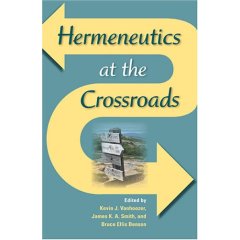Kevin Vanhoozer - "Discourse on Matter"

Kevin Vanhoozer is an editor of a new collection of essay's on hermeneutics. His essay is particularly fascinating and I have interacted with it in depth here:
http://erdman31.googlepages.com/Review-Vanhoozer-DiscourseonMatter.pdf
Here is my brief summary of Vanhoozer's article:
Vanhoozer raises a critical question for hermeneutics and biblical interpretation: To what extent are we active in the process of interpretation, and to what extent are we passive? Another way of putting the question is: Is interpreting the biblical text something I have control of, or is there a more mystical and intangible element at work. The intangible element is represented by the school of philosophical hermeneutics.Vanhoozer shows that philosophical hermeneutics, represented particularly by Hans-Georg Gadamer, appeals to a mystical or even a “miracle” element in the nature of understanding. Vanhoozer takes seriously the contribution of philosophical hermeneutics and finds a similarity with the thinking of Karl Barth. Vanhoozer, however, adds a distinctively Christian twist to what he perceives as secular hermeneutics. The twist is that rather than appealing to the mystical or the miracle element, as Gadamer had done, Vanhoozer employs Christian theological categories like “grace,” “illumination,” and the activity of being “in Christ.”
Here are the first few paragraphs from my in-depth interaction that I noted above:
I find Vanhoozer’s recent essay on understanding to be a very critical and important work for hermeneutics in general and for biblical studies in particular. Vanhoozer raises a fundamental question for interpretation and understanding, a question that has been kicking around here and there for the past century or so in one way or another amongst scholars and academics, not the least of which are the likes of Hans-Georg Gadamer and Karl Barth. Vanhoozer clearly articulates this question and seeks to explore the answer within a distinctively Christian framework.
The question goes as follows: “Is understanding a type of active mastery or a passive happening? Is it something the interpreting subject does, or is understanding done to the interpreter by the subject matter."
This has been a critical question in my mind for several years and I believe it has critical ramifications for biblical studies on all levels: from the most erudite and academic considerations to the most practical interactions of pastors and teachers within the local church setting. The question centers on the extent to which we as interpreters have control over the process of understanding and the extent to which we, ourselves are actually controlled by the biblical text. Are we in control of the Scripture, or do the Scriptures control us?
If we are the masters of interpretation, does this mean that biblical interpretation is strictly a matter of applying the right rules and procedures? Can we gain understanding by simply applying the right method of interpretation? Or is there something more – something intangible that is at work in this process of understanding the written Word of God?
Citation:
Kevin Vanhoozer, “Discourse on Matter: Hermeneutics and the ‘Miracle’ of Understanding,” in Hermeneutics at the Crossroads, ed. Kevin J. Vanhoozer, James K.A. Smith, and Bruce Ellis Benson (Bloomington and Indianapolis: Indiana University Press, 2006).
Other essays reviewed in Hermeneutics at the Crossroads:
Bruce Ellis Benson "The Improvisation of Hermeneutics"
James K.A. Smith "Limited Inc/arnation"
Kevin Vanhoozer "Discourse on Matter"
Nicholas Wolterstorff "Resuscitating the Author"







1 comment:
視訊美女 live0204173liveshow 視訊美女視訊ukiss173liveshow 視訊美女0401 影音視訊美女聊天室0401 影音視訊美女聊天室視訊美女一對一視訊美女一對一0401 視訊美女0401 視訊美女168 視訊美女168 視訊美女五分鐘護半身視訊美女視訊美女34c五分鐘護半身視訊美女99 視訊美女主播 500 點99 視訊美女主播 500 點888 視訊美女聊天室888 視訊美女聊天室視訊美女 live0204視訊美女 live0204173liveshow 視訊美女173liveshow 視訊美女0401 影音視訊美女聊天室視訊ggo0401 影音視訊美女聊天室gogogirl 視訊美女gogogirl 視訊美女av080 toav080 to
Post a Comment